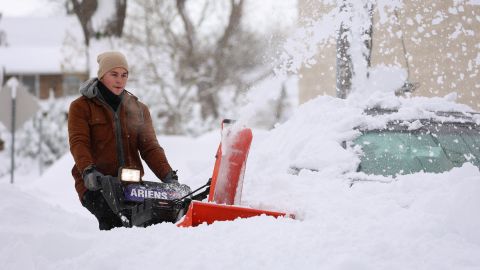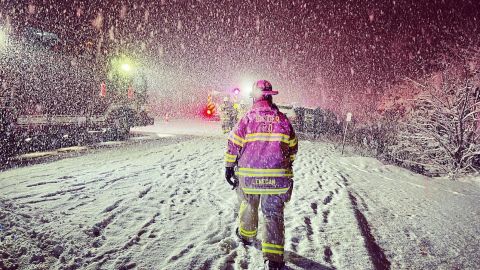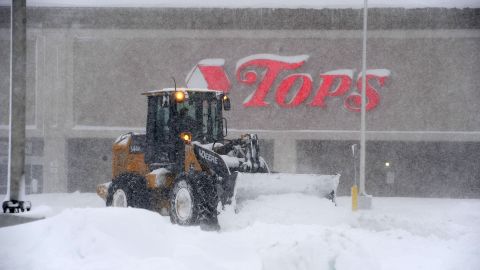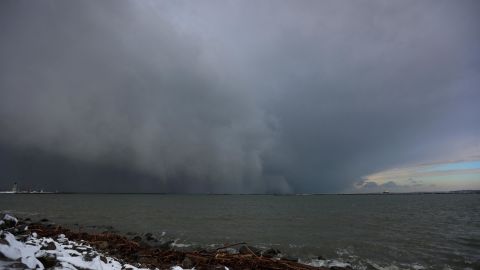CNN
—
Heavy snowfall is pounding parts of western New York state as a potentially historic storm that’s halted traffic on major roadways threatens to topple trees, damage property and knock out power as temperatures plunge.
Snowfall totals have now reached 5 feet in at least one location. Orchard Park, where the Buffalo Bills had been scheduled to play their now-relocated NFL game Sunday, had snowfall totals of up to 66 inches by Friday evening.
Two Erie County residents have died after suffering cardiac events related to shoveling or blowing snow, County Executive Mark Poloncarz announced.
“We send our deepest sympathies and remind all that this snow is very heavy and dangerous,” Poloncarz tweeted.
About 6 million people in five Great Lakes states – from Michigan to New York – are under snow alerts Friday, CNN Meteorologist Haley Brink said.
Buffalo’s highest three-day snowfall is 56.1 inches, which occurred in December 2001, CNN Meteorologist Brandon Miller said. Indeed, given the rate of snowfall, Buffalo may see a month’s worth of snow in only a few hours. That could make this month the snowiest November since 2000, when 45.6 inches in total fell in the city during the entire month, Miller added.
The heaviest bands of snow Friday were off Lake Erie and Lake Ontario.
As the region braces for more:
• As of Friday night, it was snowing 1-3 inches in the area, according to the National Weather Service in Buffalo.
• Buffalo has a ban on vehicle travel in the southern part of the city and advisories elsewhere.
• According to FlightAware.com, about 70% of outgoing flights were canceled at the Buffalo airport, which has almost 13 inches of snow.
• The NFL earlier this week moved the Bills’ game against the Cleveland Browns to Detroit. The team hopes to travel from Buffalo on Saturday.
• Hamburg, around 15 miles south of Buffalo, had almost 34 inches of snow by 8 a.m.
• Buffalo public schools were closed Friday. So are Erie County services.
“In those areas where the snow is falling that fast, it can be very dangerous,” Buffalo Mayor Byron Brown told CNN’s “The Situation Room With Wolf Blitzer.” “Fortunately, most of metro area Buffalo is in good shape. … South buffalo has gotten extremely hard like the south towns of Buffalo have been hit hard.”
Earlier, New York Gov. Kathy Hochul Implored residents to take caution this weekend and described the storm as a “major, major” snowfall event that could be as life-threatening as the November 2014 snowstorm that claimed the lives of 20 people in the Buffalo region.
Hochul declared a state of emergency for 11 counties.
“This is a super-heavy storm,” Brown told CNN. “Right now, most of the city is in good shape – south Buffalo getting hit very hard. We anticipate that the rest of the city could get hit as hard” later in the day.
Nicole Erb told CNN early Friday afternoon: “It’s a mess out here,” in the backyard of her Orchard Park home.
She estimated she has about 4 feet of snow around her house.
This isn’t Erb’s first snow storm as she’s lived in western New York her entire life. “We know how to handle it,” she said, “It’s keeping people off the roads so plows can do their things, checking in with your elderly neighbors, and not using generators inappropriately.”

But even some of the people clearing roads were getting stuck, Poloncarz, the Erie County executive, said.
“There are vehicles stuck on roads who should not be driving. There are even some snow plows getting stuck in the worst parts of the storm,” he wrote on Twitter.

Commercial traffic was banned on the New York State Thruway (Interstate 90) between exits 53 and 59, according to the agency that operates the highway. Other parts of major interstates – including 290 and 990 – were also shut down.
Officials in Erie County – which includes Buffalo – also declared a state of emergency and banned driving beginning Thursday night. Prohibitions on driving in the northern and southern part of the county were lifted Friday afternoon.
“The lake effect snow from (the storm) is very heavy and may cause tree branches to fall and damage vehicles, property or powerlines. Watch where you park, and be aware of your surroundings if going outside,” Erie County officials wrote online.
Residents of Williamstown in Oswego County near Lake Ontario saw 24 inches of snow as of Thursday evening, according to the weather service. In neighboring Oneida County, some spots were blanketed with 14 inches of snow in the 24 hours before Thursday evening, per the weather service.

The heaviest snow has shifted just a few miles south of the hardest hit region early Friday evening, according to CNN meteorologist Taylor Ward. But the snow band is expected to return back to the north later in the evening and even shift far enough north that downtown Buffalo gets into the heavy snow again overnight and early Saturday.
Much of the area gets a break by Saturday afternoon as the snow shifts even farther north. A final band comes through Saturday evening and into the overnight hours before snow tapers off early Sunday.
“Colder air will continue to pour across the region, resulting in a prolonged lake effect snow event, which will last through this weekend.” National Weather Service forecasters in Buffalo said Friday morning. “Two intense plumes of lake effect snow with snowfall rates of at least 3 inches per hour will continue northeast of the lakes through tonight.”
Lake-effect snow happens when very cold, windy conditions form over a relatively warm lake – meaning the lake might be 40 degrees while the air is zero degrees, Miller explained. The temperature clash creates instability, which allows for the most extreme winter weather to occur.

Other areas affected by the storm include parts of the Upper Peninsula and the western Lower Peninsula of Michigan, where gusty winds and heavy snow will also cause near zero visibility and unsafe travel conditions.